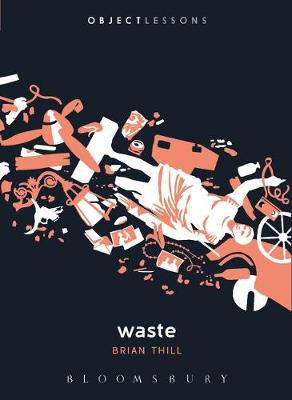
Stock image for illustration purposes only - book cover, edition or condition may vary.
Description for Waste
Paperback. "Waste "explores the question: from nuclear waste to digital detritus, what can we learn about ourselves from what we let go to waste? Series: Object Lessons. Num Pages: 152 pages, 20 b/w images. BIC Classification: DSA; HPN; JFCD. Category: (G) General (US: Trade). Dimension: 123 x 165 x 14. Weight in Grams: 142.
Object Lessons is a series of short, beautifully designed books about the hidden lives of ordinary things. Though we try to imagine otherwise, waste is every object, plus time. Whatever else an object is, it's also waste-or was, or will be. All that is needed is time or a change of sentiment or circumstance. Waste is not merely the field of discarded objects, but the name we give to our troubled relationship with the decaying world outside ourselves. Waste focuses on those waste objects that most fundamentally shape our lives and also attempts to understand our complicated emotional and intellectual relationships to our own refuse: nuclear waste, climate debris, pop-culture rubbish, digital detritus, and more. Object Lessons is published in partnership with an essay series in The Atlantic.
Product Details
Publisher
Bloomsbury Publishing Plc
Format
Paperback
Publication date
2015
Series
Object Lessons
Condition
New
Number of Pages
152
Place of Publication
New York, United States
ISBN
9781628924367
SKU
V9781628924367
Shipping Time
Usually ships in 5 to 9 working days
Ref
99-1
About Brian Thill
Brian Thill is Professor of English at Golden West College, USA. His writing has appeared in The Atlantic, Jacobin, Mediations, 3:AM Magazine, the Los Angeles Review of Books, and elsewhere.
Reviews for Waste
Fascinating, thought-provoking, and necessary, Brian Thill's Waste is about not just our present but our future. You can't read it and come out of the experience unchanged.
Jeff VanderMeer, New York Times-Bestselling Author of The Southern Reach trilogy
If 'waste,' as Brian Thill points out, is any object plus time, then Waste is waste plus spirited curiosity and tremendous intelligence. With a gaze full of vigor and heart, Thill looks at the fate of what we discard-from space junk to horse corpses to bird bellies split open from plastic-and illuminates invisible margins we'd often rather forget. I read the whole book in one sitting, spellbound.
Leslie Jamison, New York Times-Bestselling Author of The Empathy Exams
Waste is the finest filth around-or really the finest mediation of it I can think of: Thill looks deeply into how what we waste controls us at the level of the personal and the public-our discards become our fate and home both-and finds treasure.
Alexander Chee, author of Edinburgh and The Queen of the Night
Waste pluralizes, names a condition into which objects fall, takes us beachcombing, dumpster diving. `Waste is every object, plus time'... The true aim of Brian Thill's book, however, is... that non-place to which waste is sent. We cannot afford... to believe in such a zone any longer. Of course, we never really could or did - out of sight was simply out of mind. Waste always kept coming back.
Julian Yates
Los Angeles Review of Books
Jeff VanderMeer, New York Times-Bestselling Author of The Southern Reach trilogy
If 'waste,' as Brian Thill points out, is any object plus time, then Waste is waste plus spirited curiosity and tremendous intelligence. With a gaze full of vigor and heart, Thill looks at the fate of what we discard-from space junk to horse corpses to bird bellies split open from plastic-and illuminates invisible margins we'd often rather forget. I read the whole book in one sitting, spellbound.
Leslie Jamison, New York Times-Bestselling Author of The Empathy Exams
Waste is the finest filth around-or really the finest mediation of it I can think of: Thill looks deeply into how what we waste controls us at the level of the personal and the public-our discards become our fate and home both-and finds treasure.
Alexander Chee, author of Edinburgh and The Queen of the Night
Waste pluralizes, names a condition into which objects fall, takes us beachcombing, dumpster diving. `Waste is every object, plus time'... The true aim of Brian Thill's book, however, is... that non-place to which waste is sent. We cannot afford... to believe in such a zone any longer. Of course, we never really could or did - out of sight was simply out of mind. Waste always kept coming back.
Julian Yates
Los Angeles Review of Books
